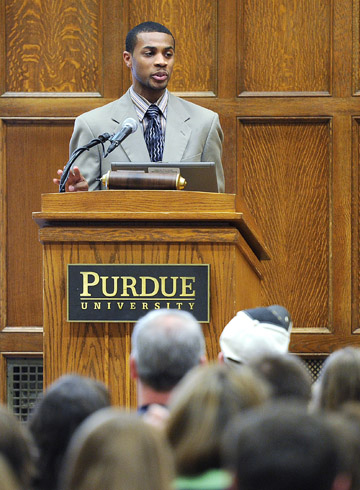Purdue Profiles: Terry Gilbert

Terry Gilbert, senior assistant director of admissions, conducts an "Introducing Purdue" session for perspective students and their parents in March at the West Lafayette campus. (Purdue University photo/Andrew Hancock)
As a student at Purdue, Terry Gilbert joined the minority peer counselors group to get students at his Indianapolis high school thinking about college. Now, as senior assistant director of admissions, Gilbert continues those efforts across the country.
Traveling everywhere from Pennsylvania to Arizona, Gilbert represents Purdue and introduces students and their families to the University. Even with a schedule full of meet-and-greets, college fairs and new initiatives, Gilbert has been able to enjoy the Liberty Bell in Philadelphia and the red rock scenery of Sedona.
What is your favorite part of your job?
Without a doubt, building relationships with prospective students and their families. A big part of my job is to help increase students from underrepresented populations with respect to ethnic, racial, gender and sexual orientation. With underrepresented populations, it is very important to develop relationships with students and their families so they can feel comfortable and confident with the institution and environment they'll be growing and learning in for the next four years.
It is really important to me that parents know there is someone on campus who cares about their child. I am very frank and candid with students. I check in on them, their lives and their grades.
In order to develop these relationships with students and their families, do you travel often?
Yes. I manage Purdue's presence in New Jersey, Pennsylvania, Illinois, Minnesota, Utah, North and South Dakota, Wyoming, Colorado, Arizona and New Mexico. I don't go to these states all the time, but I try to keep in touch so I know what's going on in the environment economically, politically and with secondary and post-secondary schools.
I travel for approximately six weeks during both the fall and spring semesters. Establishing relationships in these places is my favorite part, but the traveling and, specifically, being away from my wife, Ebony, and our two young daughters is hard sometimes.
You received your undergraduate degree from Purdue. Why did you decide to return to begin your career?
When I was a minority peer mentor through the admissions office, I thought recruitment is something I might want to do, but after I graduated in 2006, I started on a track to management at State Farm insurance.
In 2008, I found out about an opening in admissions at Purdue, and when I came back to campus for the interview, it felt like I was coming home. It wasn't a feeling I had expected, so I knew I had to take the job if it was offered, and it was.
Have there been any memorable moments from your time working in admissions?
One thing that stands out was the opportunity to coordinate the Emerging Urban Leaders Scholarship last year. This was the first class to receive the scholarship, and the first time I had ever helped put a cohort of scholars together. To be able to affect the first recipients in that way is really memorable for me. The most rewarding part is whenever I can see that I have affected the students I work with in a positive way.
Is the Office of Admissions working on any new initiatives to increase diversity and inclusion?
To ensure we have diverse, prepared and successful classes, we are planning an initiative to go into middle schools. It will be great to enter students' thought processes at a young age. We are working with some schools in Indianapolis to begin a curriculum where we are in touch with the students and their parents throughout the year, not just for one day.
This curriculum isn't Purdue-specific -- although there will be some "come to Purdue" messages. It is about why college is important, what is needed to get there, what a college education can help students attain and how it can affect the family tree. We hope to start the curriculum next fall.
Why are diversity and inclusion important at Purdue?
Our world is constantly moving to a more global environment, and as a university, one of our goals is to prepare students to be tomorrow's leaders. In order to do that, we need to simulate the global environment they will be living and working in after graduation. Interacting with people with different backgrounds and interests gives our students a broader knowledge base and will make the transition to a global work environment smoother. Also, it just makes everything more fun.
